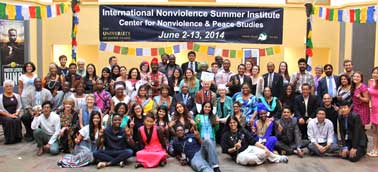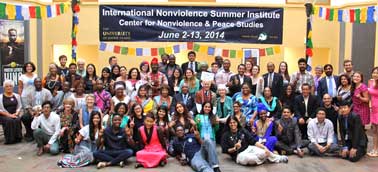KINGSTON, R.I. – May 12, 2015 – Police shootings, mass killings and gruesome beheadings dominate today’s headlines, leaving some wondering if violence is the new normal.
 There’s no better time, then, to promote peace. That’s the goal of nonviolence training sessions offered next month by the Center for Nonviolence and Peace Studies at the University of Rhode Island.
There’s no better time, then, to promote peace. That’s the goal of nonviolence training sessions offered next month by the Center for Nonviolence and Peace Studies at the University of Rhode Island.
Community leaders from Nepal, India, Ghana, Palestine, Turkey, Pakistan, Germany, Liberia, Tibet and China are expected at the program, June 1 through 12 at URI’s Multicultural Center, 74 Lower College Road, on the Kingston campus. To register, call 401-874-2875.
“They are all participating in a unique, American-brand of social activism, to deal with conflicts in their world,” says Paul Bueno de Mesquita, center director and a URI psychology professor. “In some ways, they’re very hungry – and some are desperate – for nonviolent methods to change their communities. People can’t thrive and develop without peace.”
The program, known as the International Nonviolence Summer Institute, has grown steadily since it started 14 years ago, attracting committed leaders who want to learn how to achieve nonviolence, conflict reconciliation and social change.
This year, about 75 participants are expected from 14 countries and nine states in the United States. Besides global leaders, teachers, students, counselors, clergy, social activists, community organizers, and health and mental health professionals are also coming.
Among the international participants are: the first woman mayor of an Afghan town now living in Westerly; a Pakistani man who works for a humanitarian group in his country; and an Afghan woman trying to improve educational opportunities for women in her country.
There are two levels of training. In Level l, participants will study, for two weeks, the nonviolent methods of the civil rights leader Dr. Martin Luther King, Jr.
In Level II, participants will study the leadership styles of King and other nonviolent leaders and how to organize and mobilize communities to peacefully resolve violence and problems of social justice. That one-week seminar will be led by Bernard LaFayette Jr., founder and former director of the center. A colleague and confidante of King, LaFayette is a civil rights activist, minister, educator and lecturer at Emory University.
In addition to Bueno de Mesquita, the other trainers will be Kay Johnson Bueno de Mesquita, an education instructor at URI; Gail Faris, former assistant director at the URI Women’s Center, and Thupten Tendhar, a graduate administrative assistant at the center.
Born to Tibetan parents, Tendhar joined a monastery in South India at age 12, where he studied for 18 years, earning the doctoral-level Geshe degree in Buddhist philosophy. He teaches “Tibetan Buddhism – Journey to Nirvana” and is pursuing his doctorate in education at URI. The center recently published his first collection of poetry, “Peace – Rhythm of My Heart.”
More than 500 people have attended the summer program since it began in 2001 with a handful of participants, mostly from the United States. Bueno de Mesquita says that over the years the program has won international acclaim.
Bueno de Mesquita is especially proud of participants who take back what they learned to their countries. Hamish Khan, of Pakistan, applies his knowledge to his education and job skills program in Peshawar Valley, one of the most volatile regions in the country.
“His organization is trying to bring positive constructive development to the area, rather than letting it be a training ground for terrorists,” says Bueno de Mesquita. “Our center is proud that he’s adopted nonviolent training as part of the group’s mission statement.”
Etiene Martines, a federal judge in Rio de Janeiro, uses what he learned at URI to resolve disputes in his courtroom. Leonardo Prieto, of Venezuela, a country plagued by gun violence and political turmoil, leads nonviolent sessions for school and community groups.
One event during the two-week program is open to the public. Kay and LaFayette will speak about their book, “In Peace and Freedom: My Journey in Selma,” on Tuesday, June 9 at 7 p.m. at the Multicultural Center. The talk is free.
For more information about the summer program, contact Thupten Tendhar at summerinstitute@dept.uri.edu. The center is also seeking volunteers to help with the program. To volunteer, call 401-874-2875.
“The sessions are not passive learning,” says Bueno de Mesquita. “People are actively engaged in intensive training activities, all day, every day. Nonviolence is an active process. You can’t be sleeping when learning about nonviolence.”
Besides the nonviolence training program, the center also offers an interdisciplinary minor for undergraduates, as well as workshops on compassion and inner peace and academic courses on Buddhist history, culture and philosophy.
For eight years, the center has also led a team of URI students in the “Second Step Violence Prevention Program” in the schools of Central Falls, one of the poorest communities in the state.
Pictured above: Participants in the 2014 International Nonviolence Summer Institute at the University of Rhode Island. The annual program is hosted by the Center for Nonviolence and Peace Studies. Photo courtesy of the center.

